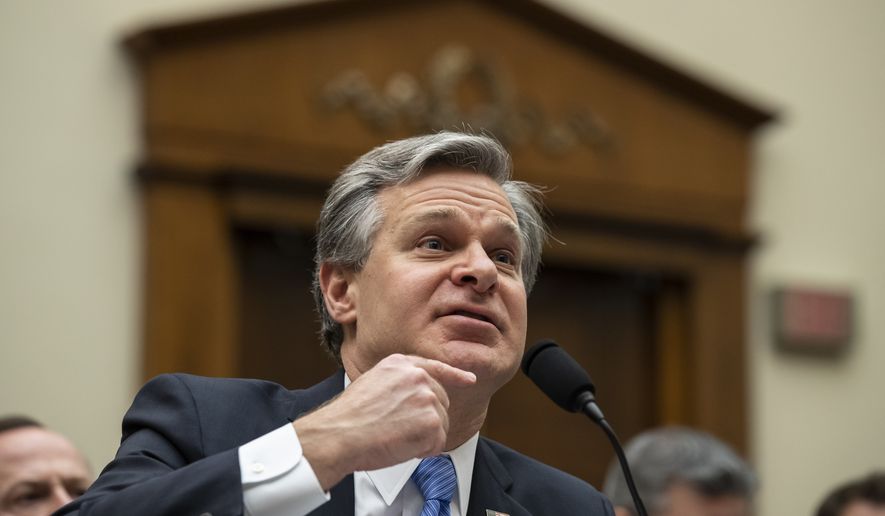FBI Director Christopher A. Wray said Wednesday that authorities remain unable to access data stored on an Apple iPhone used by the Saudi Arabian military officer who opened fire nearly two months earlier at a U.S. naval base in Pensacola, Florida.
Mr. Wray discussed the FBI’s attempts to access the data during a House Judiciary Committee hearing while answering a question posed by Rep. Matt Gaetz, Florida Republican.
“One of the things that the shooter in Pensacola did — in the heat of the moment, while people were coming at him and he was coming at them — [he] took the time to shoot one of his own phones to destroy it, so that presumably we, law enforcement, wouldn’t have access to what’s in it,” said Mr. Wray.
The FBI was ultimately able to reconstruct the shooter’s iPhone but has been unsuccessful so far in its efforts to extract encrypted data from the device, Mr. Wray explained.
“[B]ecause of the way the encryption is on the phone, we don’t have meaningful access to the content of that phone,” said Mr. Wray.
“So whatever it is he was trying to prevent us all from seeing, we don’t know. And we’re currently engaged with Apple, hoping to try to see if we can get better help from them to try to get access to the contents of that phone,” Mr. Wray added.
Apple did not immediately return a message requesting comment.
The FBI previously identified Mohammed Saeed Alshamrani, a second lieutenant in the Royal Saudi Air Force, as the sole gunman responsible for opening fire at Naval Air Station Pensacola on February 6, killing three sailors and injuring eight others.
Alshamrani, 21, was shot and killed by a sheriff’s deputy responding to the rampage.
The situation bares similarities to a mass shooting that took place in late 2015 in San Bernardino, California, in which federal investigators initially found themselves unable to access data stored on an Apple iPhone that belonged to a slain gunman held responsible for that attack. The Department of Justice under former President Barack Obama subsequently sued Apple in federal court in an effort to compel the company’s assistance prior to eventually unlocking the phone by hiring a company to hack the device.
More recently, both President Trump and his attorney general, William P. Barr, have urged Apple to help authorities unlock two iPhones used by Alshamrani.
“This situation perfectly illustrates why it is critical that the public be able to get access to digital evidence,” Mr. Barr said last month.
“They could have given us that information. It would have been very helpful. Apple has to help us. And I’m very strong on it,” Mr. Trump added days later.
Several security companies that cater to federal law enforcement agencies offer products touted as being able to unlock Apple products, however, suggesting the iPhone maker’s assistance is not required to extract data from Alshamrani’s devices.
Apple previously pushed back after Mr. Barr accused the company of not providing “substantial assistance” to authorities attempting to access Alshamrani’s iPhone data.
“We reject the characterization that Apple has not provided substantive assistance in the Pensacola investigation,” the company said in a statement last month. “Our responses to their many requests since the attack have been timely, thorough and are ongoing.”
• Andrew Blake can be reached at ablake@washingtontimes.com.




Please read our comment policy before commenting.